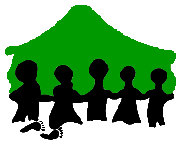Yakin, the Nasrullah Islamic Welfare Foundation sent by far the greatest number of children to Indonesia. Yakin was established in 1982 in Kuluhun, a suburb in eastern Dili. The founders were members of the Indonesian Islamic Propagation (or Missionary) Council, Dewan Dakwah Islamiyah Indonesia, DDII, and local East Timorese of Arab descent, especially members of the Sagran family. On the site in Kuluhun Yakin built schools of various levels and child care institutions. In 1997 the Indonesian Council of Islamic Scholars, Majelis Ulama Indonesia, MUI, built its East Timor headquarters there.
While some children studied in the complex, most of the children stayed there for a short time only before placements were found for them in child care institutions and pesantren in Indonesia. When an offer arrived from an institution in Indonesia, if there were not already children who fitted the criteria living in the institution, staff from Yakin travelled to the districts to find suitable children. The receiving institutions were situated all over Indonesia, and were of many different theological orientations. Yakin’s only criteria was that the institutions provided the children with free care and education. Sometimes children arrived in Indonesia and the placements were already filled. Yakin staff would then travel around the area lobbying institutions to take in a small number of children who had arrived but found themselves with nowhere to go.
Often soldiers persuaded parents to send their children to Indonesia with Yakin and in some cases they organised the transfer of the children to Dili. Many of the children were organised by a first generation of East Timorese converts to Islam. These young men had been taken to institutions in Indonesia by soldiers, senior public servants and DDII missionaries in the early 1980s. They returned as preachers to their districts of origins and converted family members and other villagers. They assisted Indonesian DDII missionaries who arrived in the district capitals to establish mosques and schools soon after the Indonesians arrived. The DDII missionaries and East Timorese preachers also persuaded families to give them their children to send to Indonesia.
In 1977 the Dili An-Nur Mosque Foundation with support from the Indonesian Department of Religious Affairs sent 29 East Timorese students of Arab descent to study in Islamic institutions in Java. Some of these children were very young, though they were accompanied by older siblings. The foundation also sent indigenous East Timorese children to Indonesian institutions. The children sent by An-Nur were older and usually had completed junior high school. Unlike the children sent by Yakin, they were generally selected on the basis of merit and were usually also more successful. Sometimes the Indonesian institutions gave children a free trip home during the long vacation to celebrate the Islamic Lebaran feast with their families in East Timor. The foundation also helped students with contacts to continue their education beyond high school.
The Hidayatullah Al-Ishlah Foundation, which had an office in Fatuhada in Dili, also sent small numbers of young children to Indonesia. In 1995 parents from Daisua village in Suai district protested about the transfer of their children organised by Hanafi Martins, an East Timorese preacher from Suai and staff member of the Foundation. They children were sent to one of the Hidayatullah network of schools situated on the outskirts of Kupang, West Timor. After police intervention the 22 children were returned.
Like all those who sent children to Indonesia, the Islamic institutions said they wanted to help the East Timorese who in their view were ‘poor and backward’. They emphasised the benefits of the free education they offered and their contribution to development in East Timor.
The sending organisations handed children into the care of Indonesian institutions and usually did little to help children stay in contact with their families, especially in the case of Yakin Foundation. Also Yakin sent many very young children who spent years with no contact with home. The organisation did not systematically keep track of the children, who regularly moved institutions and in some instances ran away. In some cases the identity of the children, their names and religion, were changed against the wishes of their parents and families.
In 1999 there were still many children living in Islamic institutions in Indonesia. The UNHCR assisted a few to return. But the children who were taken to Indonesia in earlier years before the referendum in 1999 had no help to return and little information about the situation in East Timor.

